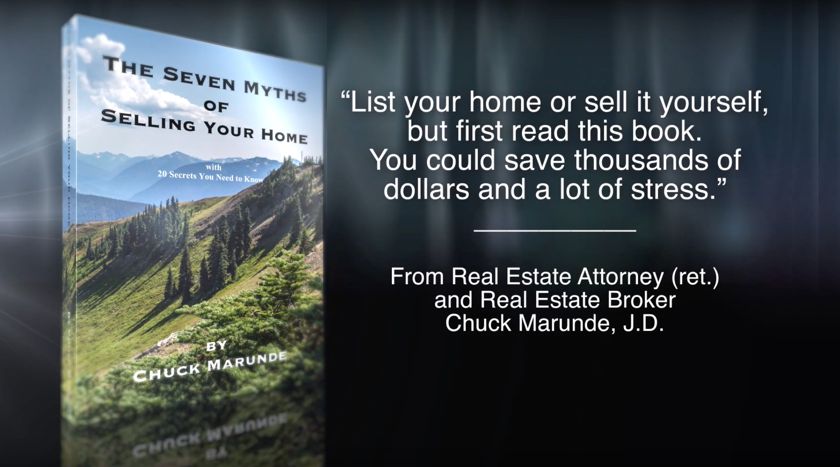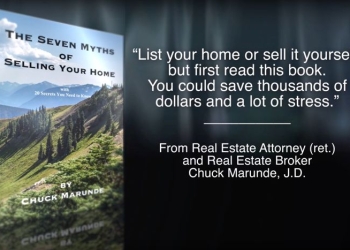This the second of 3 installments of Chapter 1 of my book, The Seven Myths of Selling Your Home. I admit this is one of my longer blog articles, but I wanted to keep this subject matter together so your reading of it would flow. If this is relevant for you as you consider selling your home, then you may want to read this in one sitting, and if this topic is not relevant for you right now, you are welcome to move past this article to more relevant topics. With over 2,200 articles, you’re likely to find what you’re looking for. Here we go, and I’ll jump right in where I left off in Part 2.
“Do open houses sell homes in small rural retirement communities?” The unequivocal honest answer is, “No!” We’ve known this for decades inside the real estate community. This doesn’t mean you shouldn’t have an open house, but if you do you should know exactly what agents know: Open houses don’t sell houses [in small towns like Sequim], but they do give agents new buyer leads.
“I’ve done too many houses where no one comes, even the neighbors. And no one would have come even if I’d guaranteed the second coming of Jesus to occur,” said broker William Metzker of Portland, Oregon-based Terradigm Real Estate Consultancy. “A few sellers want no part of them, but most do, because they’ve bought into the myth that people often buy homes during an open house,” Metzker said. “Statistically, that’s far from true.”
The purpose of an open house is first and foremost to promote the real estate agent. It’s nice if you want to help your listing agent get new leads by letting him hold an open house, but don’t be under the misconception that your agent will sell your home at the open house. He or she could sell it, but the odds of that happening are probably less than 1 in 100 in a small rural market. There are better ways to spend time and money. As long as you understand that, you won’t be disillusioned if nothing happens at your open house.
Accurate statistics on the success of open houses are sorely missing. What is clear is that on a nationwide basis, open houses are a disaster as a marketing tool to sell a house at an open house. There are thousands of stories written by agents on the Internet affirming this. But there are nuances that account for different opinions on open houses. For example, metropolitan areas will have short spurts of success with open houses in extremely hot markets.
In rural areas where buyers are largely retirees from other parts of the country, open houses are quite useless. Less than 2% of homes sell at open houses in a normal real estate market according to the National Association of Realtors (NAR), and I’m sure that was in the metropolitan markets. In a real estate recession like the one we have experienced, my guess is that far less than 1% of homes sell at any open house weekend in a metropolitan area, and in a rural market where the buyers are almost entirely retirees from outside the area, probably less than 1/10th of 1% of homes sell at an open house.
Redfin did a study of open houses, and they concluded in part that, “In the other eight markets we examined, there was virtually no difference in the percentage of homes that sold, whether they had an open house or not. So should you hold an open house? If you’re in San Francisco, absolutely. If you’re in Phoenix or Las Vegas, probably not. Everywhere else, it most likely doesn’t really matter whether or not you hold an open house . . .”
Open House – Reason No. 1. So why would agents hold an open house in a rural area? There are two reasons. First, they hold open houses to satisfy their selling clients, to be able to tell them they are doing something to market their homes. I’ve heard agents say, “I’ve got to show my clients I’m doing something, anything.”
Open House – Reason No. 2. The second reason is more substantive. Agents hold an open house so they can get a list of prospective buyers. There it is! The primary purpose of an open house is to generate leads for the agent. Proof: Go to an open house and listen to the questions the hosting agent asks you. Do you live in the area? How soon do you plan to buy a home? Have you pre-qualified? What is your price range? What kind of work do you do? Do you both work? How many children do you have? Where do you live now? Do you rent or own? Would you sign-in here with your name, address, phone number, and email address?
Why would you give an agent you have not even hired to represent you all this personal information? Some astute buyers know that open houses can be a trap, and they actually avoid them rather than get into a conversation with an agent who is trying to hook them. Some buyers realize that the listing agent who is hosting the open house represents the seller, not the buyer. That listing agent has a legal and fiduciary duty to get the seller the highest possible price and the best possible terms. Smart buyers do not want to give the seller’s agent all their personal information, information that could be used to negotiate against them. [Buyers often tell the listing agent that they have pre-qualified and for how much, that they sold a home and for how much, and sometimes how much cash they have for a down payment. The listing agent can use all of this against them since that agent represents the seller. So much for an open house being a good idea.]
Who actually shows up at open houses in a rural area? Curious neighbors, tire kickers, locals taking a Sunday drive and out for a little fun, not car loads of qualified buyers. Believe me, I’ve been there, done that too many times. Apart from the fact that open houses rarely sell a home, there are three reasons holding an open house for the public is not advisable.
Open House Warning No. 1: As a real estate broker, I periodically receive an email alert notifying me that there is a criminal frequenting open houses. That is a rare event in a small rural area, but it is not unheard of in the metropolitan areas. This alone might be a reason a homeowner, especially an elderly person, might choose not to hold an open house.
Open House Warning No. 2: Did you know that a homeowner who invites the public to attend an open house may be liable if one of those guests falls and suffers from an injury? We all know we are now living in a litigation prone generation, and it would be a tragedy if someone slipped and fell and then sued for a judgment equal to the equity in the home. Ridiculous lawsuits are far too prevalent in the U.S.
Open House Warning No. 3: This may be the ultimate reason a homeowner decides not to be involved with open houses. Open houses simply do not sell homes in rural areas, especially when the majority of buyers are from outside the area. They are a colossal waste of time and money.
Open Houses for Agents Only: There is one kind of open house that a home seller might consider, an open house for other real estate agents. It’s nice to introduce other agents to a listing, but it’s effectiveness is negligible, because if an agent has a buyer for a particular kind of home, he will show every available listing that fits those parameters.
The truth is agents haven’t seen most of the listings in their market. A small MLS might have 800 listings. An active agent might have seen 10% of those listings. That means we show and sell listings that we haven’t seen in advance all the time. A broker open house is near the bottom of effective selling techniques. It becomes a matter of where time and resources will be spent most effectively marketing a home. With the Internet, an agent can sit in his office and look at 50 homes and examine all the details and photos in the time it takes to drive out to look at one Realtor open house.
Now would you like to know why agents hold open houses for agents? Again, in a large metropolitan area the dynamics of open houses are different, and bringing agents could be helpful if one of those agents has a buyer for that exact kind of home and area. But in a rural area, why would agents hold open houses for agents? It is rare that one of those agents would attend an agent open house and sell it as a result. That’s unheard of.
The real reason for agent open houses in rural areas is to show the home seller that the listing agent is doing something to market the home. [Seriously, that’s the reason.] So agents do favors for each other by attending their agent open houses and leaving lots of business cards on the kitchen counters. It looks impressive to a home seller. It seems like these people are really marketing up a storm. [Wow, look at all those cards!]
Again, this approach focuses more on appearances and perceptions than it does on effective marketing and advertising. Now for any of these methods, there will always be someone somewhere in the United States who will say, “I sold a home that way,” but one lucky sale does not prove the effectiveness of a method. In fact, it may actually prove the ineffectiveness if only a tiny percentage of sales out of a thousand sales are made using that method.
Stay tuned for the next and final installment of this Chapter.
Last Updated on October 22, 2019 by Chuck Marunde






























